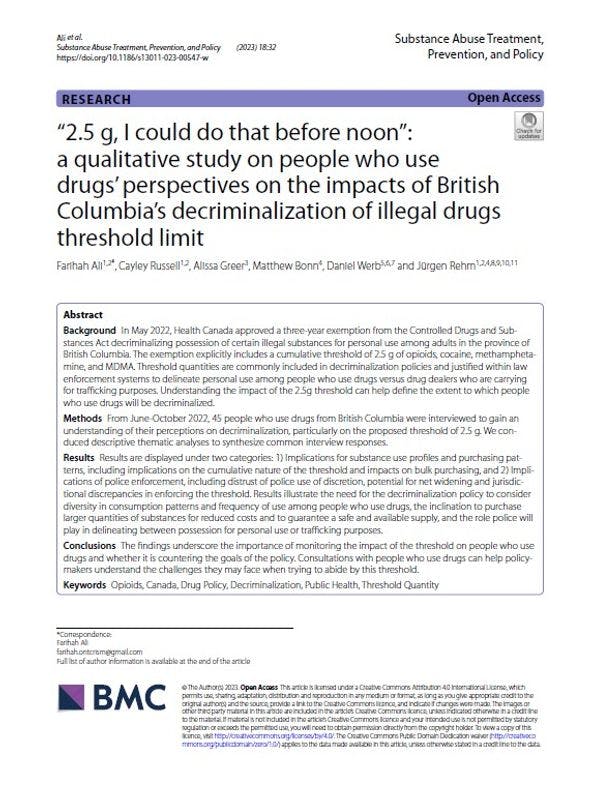« 2,5 g, je pourrais le faire avant midi » : Une étude qualitative sur les perspectives des personnes usagères de drogues sur les impacts du seuils relatifs à la décriminalisation des drogues illégales en Colombie-Britannique
Ali et al. examinent la politique de décriminalisation de la Colombie-Britannique et invitent les décideurs politiques à consulter les personnes usagères de drogues afin de comprendre et de minimiser les conséquences néfastes potentielles des seuils établis. Pour en savoir plus, en anglais, veuillez lire les informations ci-dessous.
Abstract
Background In May 2022, Health Canada approved a three-year exemption from the Controlled Drugs and Substances Act decriminalizing possession of certain illegal substances for personal use among adults in the province of British Columbia. The exemption explicitly includes a cumulative threshold of 2.5 g of opioids, cocaine, methamphetamine, and MDMA. Threshold quantities are commonly included in decriminalization policies and justifed within law enforcement systems to delineate personal use among people who use drugs versus drug dealers who are carrying for trafcking purposes. Understanding the impact of the 2.5g threshold can help defne the extent to which people who use drugs will be decriminalized.
Methods From June-October 2022, 45 people who use drugs from British Columbia were interviewed to gain an understanding of their perceptions on decriminalization, particularly on the proposed threshold of 2.5 g. We conduced descriptive thematic analyses to synthesize common interview responses.
Results Results are displayed under two categories: 1) Implications for substance use profiles and purchasing patterns, including implications on the cumulative nature of the threshold and impacts on bulk purchasing, and 2) Implications of police enforcement, including distrust of police use of discretion, potential for net widening and jurisdictional discrepancies in enforcing the threshold. Results illustrate the need for the decriminalization policy to consider diversity in consumption patterns and frequency of use among people who use drugs, the inclination to purchase larger quantities of substances for reduced costs and to guarantee a safe and available supply, and the role police will play in delineating between possession for personal use or trafcking purposes.
Conclusions The findings underscore the importance of monitoring the impact of the threshold on people who use drugs and whether it is countering the goals of the policy. Consultations with people who use drugs can help policymakers understand the challenges they may face when trying to abide by this threshold.
Keywords Opioids, Canada, Drug Policy, Decriminalization, Public Health, Threshold Quantity
